-
About
First-Year Application Deadline
Don't miss your chance to apply to Marist and join the Red Fox Family!
• Early Decision II and Regular Decision: Sunday, Feb. 15About
-
Academics
First-Year Application Deadline
Don't miss your chance to apply to Marist and join the Red Fox Family!
• Early Decision II and Regular Decision: Sunday, Feb. 15Academics
-
Admission & Financial Aid
First-Year Application Deadline
Don't miss your chance to apply to Marist and join the Red Fox Family!
• Early Decision II and Regular Decision: Sunday, Feb. 15Admission & Financial Aid
-
Student Life
First-Year Application Deadline
Don't miss your chance to apply to Marist and join the Red Fox Family!
• Early Decision II and Regular Decision: Sunday, Feb. 15Student Life
- Athletics
A man working in front of the computer
School of Management
January/February 2020
Hancock Happenings
Last November was a busy month for Associate Professor of Finance Brian Haughey and his students. SoM Board of Advisors 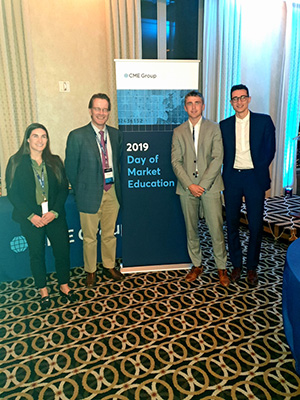
As in previous years, a team of SoM students competed in the CME Group University Trading Challenge, a unique electronic competition in which students trade futures contracts in real-time on a simulated trading platform; more than 500 teams from 37 countries took part in the competition in 2018. The 2019 Red Fox team members were Andrea Bernardi '21, John Oxner '21, Christie Thomas '20, Reanna Notarantonio '20 and Michael Lorello '20.
Once the competition ended, participants were invited to CME’s Day of Market Education, a one-day conference that focused on the financial industry. Haughey accompanied three team members – Bernardi, Oxner, and Thomas – to Chicago for this event. “Visiting the CME was a great experience,” said Oxner. “The conference allowed me to meet students from all over the world who were passionate about finance, while getting to hear lectures from some of CME’s key employees.” Thomas said she had “a great time” participating in the Trading Challenge. “I encourage students to take advantage of the opportunity to learn more about the commodity markets, practice their trading skills, and attend the Day of Market Education.” Bernardi, who is from Italy, neatly summed up the experience: “I believe these opportunities are very valuable because they present concepts from a professional standpoint, which is more concrete than when we observe the same topics in a book.”
IN THE PHOTO (from left): Christie Thomas ’20, Prof. Brian Haughey, John Oxner ’21 and Andrea Bernardi ’21 at the CME Group Day of Education event in Chicago
Seniors attend Beta Gamma Sigma summit
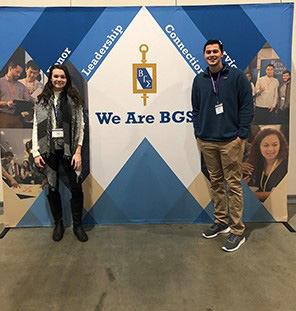
Kruszewski found the trip educationally valuable, both for herself and her classmates. “Brendan and I learned many skills regarding leadership, collaboration, and decision-making in business that we have brought back to Marist to share with our colleagues,” she said.
In existence since 1913, Beta Gamma Sigma is the international honor society for business students attending schools accredited by the Association to Advance Collegiate Schools of Business (AACSB).
IN THE PHOTO (from left): Seniors Jessica Kruszewski and Brendan McCarthy at the BGS Summit
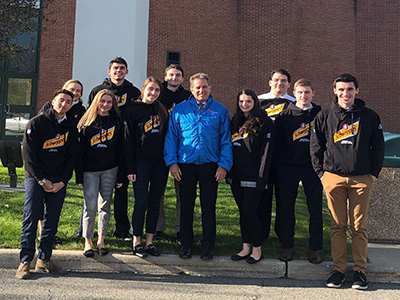
Tim Tenney, the president and CEO of Pepsi Cola of the Hudson Valley, and vice-chair of the Marist College board of trustees, welcomed students from Assistant Professor of Management Pamela Harper’s business capstone class to his bottling site in Newburgh, NY on November 8. The business was founded in 1946, when Tenney’s father, Tom (a World War I fighter pilot), bought the franchise rights. Tim Tenney joined the business — which markets carbonated beverages, still and sparkling water, sports and energy drinks, and ready-to-drink teas and coffees — in 1976; he was named president in 1983 and CEO in 1989. He has been a member of the Marist board since 1999; on December 7, he was one of several executive reviewers who critiqued the final capstone presentations made by the same students he met in November. (Look for more on this story in our next issue.)
IN THE PHOTO: Tim Tenney (center) is surrounded by SoM capping students outside his Pepsi site in Newburgh
Last fall, the Marist chapter of the American Marketing Association (AMA) got the academic year off a fast start.
The purpose of the chapter is to “promote interest in the marketing profession,” says President Victoria Medlicott ’20. “The AMA is a national organization and having a chapter on campus allows us to connect to the greater marketing world.” With “a ton” of relevant articles, job listings and other online resources, she says the organization’s website “really helps marketing majors learn about what’s going on in the industry and get a better understanding of it.”
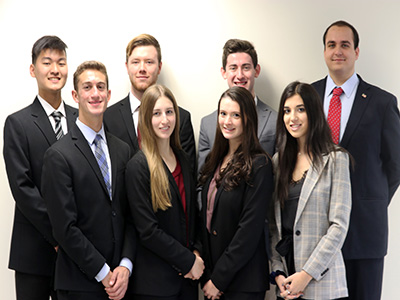
The club’s board met weekly last fall, and is in the process of “reinventing the club,” Medlicott says: “We are figuring out what direction we want to go in and what events we’d like to hold. Our goal is to have both a general meeting and an event each month.” Guest speakers, site visits to various companies and co-events with AMA chapters at other local colleges are some of the ideas being considered. Along with Medlicott, the board is comprised of chapter Vice President Evan Michigan ’20, Executive Secretary Vincent Manna ’23, and vice presidents Lexie Mouzakes ’20 (promotion), Alex Diana ’22 (events), and Brianna Prego ’21 (membership). Connor Breit ‘21 assumes the role of vice president of finance while current VP Maurice Koh ’22 studies abroad this spring. Assistant Professor of Marketing Halimin Herjanto is the club’s faculty advisor.
Last semester, the chapter hosted an introductory meeting, and followed it up with a session focused on finding and landing internships. In November, Poughkeepsie Allstate Insurance agent Frank Menes gave a presentation on how to execute a marketing plan. “He talked about his career and related it to marketing,” Medlicott says. “It was cool to see his way of thinking.”
Interested students can check out the chapter’s Instagram account (ama.marist1) or join its iLearn site (Marist AMA); email can be sent to ama.marist1@gmail.com. Members are encouraged to get actively involved in the club. “We have two main subcommittees – advertising and promotion, and events,” Medlicott says, “so members can help create posters, social media posts, and other materials.”
IN THE PHOTO (from left) AMA board members (back row) Maurice Koh ’22, Connor Breit ’21, Alex Diana ’22 and Evan Michigan ’20. Front row: Vincent Manna ’23, Victoria Medlicott ’20, Lexie Mouzakes ’20 and Brianna Prego ’21
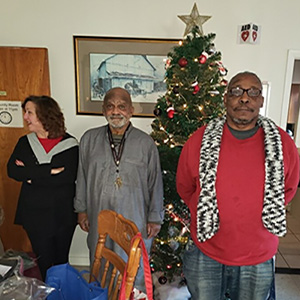
IN THE PHOTO (from left): Prof. Elizabeth Purinton-Johnson delivers knitted items to Liberty Station veterans Steven Thompson and Robert Jones
School of Management administrators and faculty members were brought up to speed on IBM’s latest technological initiatives while visiting the company’s T. J. Watson Research Center in Yorktown Heights, NY. Deans Lawrence Singleton, Joanne Gavin and James Phillips, along with professors David Gavin, Alexander Henderson, Jay Pantaleo and J. Donald Warren, Jr. attended the Sept. 6 event, which featured several presentations focused on the future of computing. The group observed a demonstration of the Project Debater, a machine that uses digital information to debate a known expert on a particular subject. Using artificial intelligence to help determine the creditworthiness of a potential borrower was discussed. Other topics included Blockchain technology, Big Data analytics, the Internet of Things and quantum computing.
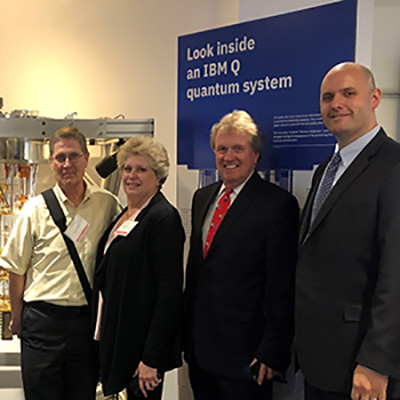
The SoM faculty was well-represented at the 46th annual Northeast Business and Economics Association conference, held in Newport, Rhode Island on Nov. 7-9. The organization’s stated purpose is to promote and facilitate the exchange of multidisciplinary research in business and economics; to that end, more than 100 papers were accepted for presentation at the meeting.
Professors Terry Ciccaglione (“How Do Hurricanes Affect State Municipal Debt Prices?”); Li Li (“Credit Risk Shocks and Banking Efficiency: A Study Based on a Bootstrap-DEA Model with Non-Performing Loans as Bad Output”); and Della Lee Sue (“Academic Achievement and Athletic Performance: Are They Complements or Substitutes?”) discussed their work during breakout business education sessions. A special Integrated Curriculum program featured a round-table discussion of various topics researched by the SoM’s Elizabeth Purinton-Johnson, John Finnigan, Carol Friedman, Rena Hill, and Robert Zito. Lastly, “Second-Hand Clothing: The Male Perspective” and “Social Media Addiction: How to Treat a Societal Necessity” were each coauthored by Purinton-Johnson and seniors Matthew Todaro, Christian Soriano, Jayson McKivergan, and Zahara Diego-Moffitt; and Matthew G. Ganguzza, Matthew Marrotti, and Bob Nkubara, respectively.
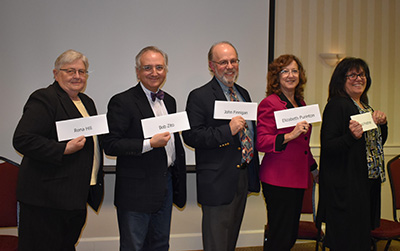
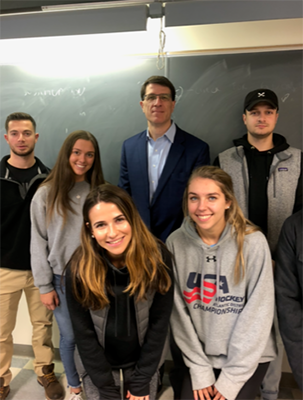
Marist alumnus Christopher M. Capone ’84 served as a School of Management executive-in-residence during the month of October. A Chartered Financial Analyst, Capone is the executive vice president and chief financial officer at CH Energy Group, the utility that provides electricity and natural gas to New York’s mid-Hudson Valley region. He earned his B.S. in business administration, with a concentration in finance, from Marist in 1984, and completed his MBA at Columbia Business School in 1999. Since 2010, he has served on the Dean’s Board of Advisors.
As part of his executive-in-residence duties, on October 21 Capone met with student leaders for a roundtable discussion of business and career issues, during which he provided advice on the attributes needed for a successful career. Capone also made presentations to two accounting classes. Prior to joining Central Hudson, Capone told the students in Accounting Theory and Practice, he was a vice president and division head at Bank of New York Mellon; he recalled how his banking colleagues questioned why he was taking a position at a utility. In the Auditing class, Capone stressed the importance of both the internal and external audit in a corporate environment. Lastly, he advised students to remain open to new opportunities, even those outside their current responsibilities.
Close to 40 alumni started their holiday celebrations by attending the annual Greystone Dinner on Dec. 6. Held at the new Marist Executive Center in Manhattan, the dinner reconnects alumni who took the Greystone classes as undergraduates. Many of the alums were managers of the college’s Greystone Equity student-managed fund during their college days.
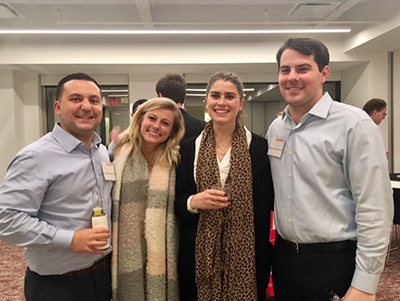
“This is our fifth year hosting the holiday dinner, and it has been encouraging to see continued engagement from our alumni base,”said event organizer Sean Sullivan ’15. “Not only is it nice to see old faces and network with new ones, but there is a shared goal for helping our current students. We look forward to future events for this group that will help bridge the gap between Greystone and Wall Street.”
Associate Professor of Finance Brian Haughey finds the dinner both enjoyable and advantageous. “It's a wonderful opportunity for me -- and the college -- to maintain our relationship with these alumni as they build their successful careers,” he said. “They are very generous with their assistance, both financially as well as professionally. Many of them return to campus as guest speakers, offer their help as mentors to current students, and provide job referrals and other assistance. We're building a very impressive network of finance professionals across the industry, which will serve as a wonderful resource to students, and the college, in the future.”
IN THE PHOTO (from left): 2018 alumni Anthony Longo, Samantha Errico, Morgan Carey and Matthew O'Connor
Alumni Profile: Owen Monaghan MPA ’09
It’s not overstating the case to say that Owen Monaghan MPA ’09 – chief of police and chief security officer of New York’s Metropolitan Transit Authority – has a big job, both in terms of responsibility and square footage. “I run the MTA police,” he says, “which is composed of police officers who patrol the New York City subway system, the Long Island Rail Road, Metro-North Railroad and the Staten Island Railway.” That works out to about 5,000 square miles of territory in two states. “But I also wear another hat,” Monaghan continues. “As the chief security officer, I’m responsible for coordinating all the security efforts for the one trillion dollars in assets that the MTA has, including trains, buses, bridges, tunnels – all of that.”
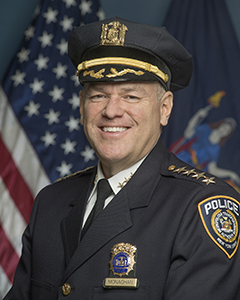
Monaghan and his wife, Marianne, have two daughters – Amy, who is completing a master’s degree at UCLA; and Kerry, who is studying international relations at the University of St. Andrews in Scotland.
Q: Would you give us a brief description of your career so far?
A: I’ve been in law enforcement for a long time. I started out as a beat cop, and I loved the job, you’re impacting people every day. I worked my way up through the ranks to captain, where you’re then known as an executive – you’re a commander, and you have your own shop. That’s when I really started to develop my leadership skills. It wasn’t until I was promoted to deputy chief, where I was in charge of several thousand cops, that I realized I needed to hone my management skills. So I signed up for the Marist MPA program. The two-and-a-half years I spent on my MPA really refined my writing, analytics and computer skills, and put me in line with my competitors in private industry.
Q: What did you learn while studying for your MPA that you use most often?
A: Every day I use the stuff I learned at Marist – as a budgeter, as a public policy maker, as a negotiator, as a human resources person. I’m so grateful to Marist for giving me those skills, I don’t know how an executive in public service can compete without an MPA. Marist really is a respected name among many of us in the public sector. I’m constantly recommending the MPA program to colleagues, especially in the NYPD.
Q: What is the career accomplishment that you’re most proud of?
A: The impact that my leadership and strategy has had on so many people in ways I’ll never know. Knowing that there are people who did not get robbed or burglarized because of the deployment strategies I put together, that gives me a feeling of accomplishment. It’s not the big save, just day-to-day police work at many different levels, from walking the beat to being a borough commander with 14 precincts under me. I tell cops all the time, you have no idea how many lives you’ve impacted or actually saved by just doing what you do, day in and day out.
Q: What is the best piece of advice (career-related or otherwise) that you’ve ever received?
A: My mother always told me, “good things happen to good people.” Just treat everyone the way you’d like to be treated. As far as career advice goes, do the best you can for the person you’re working for, and opportunities will open up.
Getting to know… Mercury, the SoM therapy dog
As you would expect, when classes are in session, the halls of Marist’s Dyson Center are often crammed with SoM students, faculty, administrators and other staff members. What you might not expect to see is an 80-pound, black brindle Greyhound named Mercury, walking obediently beside his owner, and therapy-dog team partner, Associate Professor of Marketing Elizabeth Purinton-Johnson.
What is this imposing animal doing in the halls of academe? “Filling the dog-shaped hole in your life for a little while,” says Purinton-Johnson with a smile. In recent years, more and more colleges – Yale and the University of Connecticut, to name two – have begun using therapy dogs to help students cope with the stress that comes with college life. “Essentially, therapy dogs help people to calm down,” says Purinton-Johnson. In Mercury’s case, that means playing the dual role of psychologist and man’s best friend. “Sometimes a student will sit on the floor telling him all their troubles. Sometimes they just want to see him and pet him for a few minutes. He just makes everyone feel better.”
A retired racing dog, Mercury is eight years old; Purinton-Johnson adopted him in 2014. She describes his personality as “a 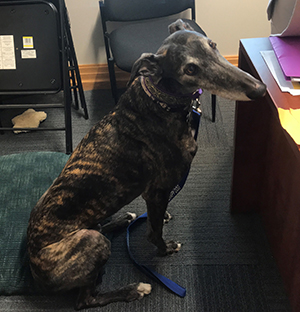
Since completing the training program, Mercury has been an occasional campus visitor – until last semester. “This past fall was the first semester I’ve bought him into the classroom on a regular basis,” the professor says. “I didn’t want to distract the students, but it’s worked out fabulously. Once we got used to his routine – wander around for pets from everyone, then lie down on his blanket – we could still discuss marketing topics without being overly distracted.”
Now Mercury comes to school “at least once a week,” says Purinton-Johnson. “I always have to be sensitive to all my students who may be allergic or frightened of him, because I will not inconvenience them.”
When asked how undergrads usually react when they see Mercury in the hallway, Purinton-Johnson gives a hearty laugh. “They get so excited,” she says. “One, there’s a dog. Two, there’s a dog that they can pet. And three, many have never met a Greyhound before.”
And Mercury’s reaction to the students? “He loves them. His nose gets out of joint if someone walks by and doesn’t make a fuss over him. I’ve had upwards of seven students loving on him at the same time, and he just enjoys every bit of it.”
Last semester, the undergraduate students in Professor of Public Administration James Melitski’s Nonprofit Management and Leadership class established “Dollars for Dogs,” a fundraiser for the Facility Service Dogs at the Children’s Home of Poughkeepsie. This organization serves children in the foster care system who have suffered abuse, neglect, and maltreatment. Although the fundraiser has ended, anyone interested in making a contribution to the service dog program can click here.
